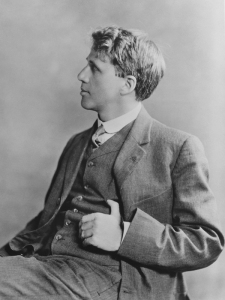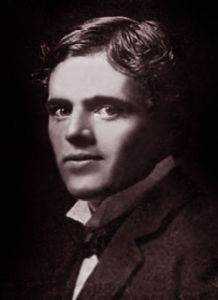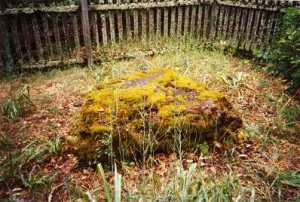Blog Archives
The Space for True Reception: Why We Love Great Verse
By Allan Cross, Reference Department
Poetry isn’t the simplest thing to appreciate. At a passing glance, it may not have the same immediacy of film, music, and visual art. When placed alongside other forms of literature, a book of poems can struggle to match our latest bestsellers in accessibility. For all these reasons, some of us might dismiss poetry as a medium for high-minded wordsmiths, rather than a readership of less heady taste. But exceptional poetry has endured for millennia, and verse as a creative avenue stretches onward still. Why, then, do so many others read and derive worth from it today?
The convenient answer nowadays might be to quote Dead Poets Society. Mr. Keating, an English teacher played by the late Robin Williams, inspires his students (and unceasing scores of audiences) with his speech about why people read and write poetry. One of the film’s great strengths lies, of course, in its poetry readings. These, combined with well-chosen samples, bring forth the emotional meaning that fuels successful verse. The film serves as a great access point to poetry, emphasizing the importance of reading it aloud. When we readers encounter a given poem, we can better involve ourselves by audibly speaking the work. By doing so, we should enhance the piece with our individual voices, each one conducive in its own distinct way.
Testing this in light of three widely known poems seems a good place to begin. The trio we have selected consists of Robert Frost’s “The Road Not Taken,” Rudyard Kipling’s “If–,” and Shel Silverstein’s verse children’s book The Giving Tree.
 In the third stanza of “The Road Not Taken,” Frost writes:
In the third stanza of “The Road Not Taken,” Frost writes:
And both that morning equally lay/
In leaves no step had trodden black./
Oh, I kept the first for another day!/
Yet knowing how way leads on to way,/
I doubted if I should ever come back.
Andrew Spacey, a commentator for Owlcation, points out that Frost’s work reflects on the many choices we make in life, and how we tend to regret those decisions after committing to them. It is also commonly read as a statement in support of individualism, and the promotion of opinions that contrast with majority views.
 Below is an excerpt from Kipling’s “If—”:
Below is an excerpt from Kipling’s “If—”:
If you can dream—and not make dreams your master;/
If you can think—and not make thoughts your aim;/
If you can meet with Triumph and Disaster/
And treat those two imposters just the same;/
If you can bear to hear the truth you’ve spoken/
Twisted by knaves to make a trap for fools/
Or watch the things you gave your life to, broken,/
And stoop and build them up with worn out tools:
The theme of Kipling’s work, which regards the importance of thought, but not to the point where it impedes action, seems like a stirring antidote to Frost. It acknowledges the significance and moral need for regret, but urges the reader not to allow past mistakes to obstruct the path to future growth.
 The Giving Tree addresses similar concerns, as shown in some of its final lines:
The Giving Tree addresses similar concerns, as shown in some of its final lines:
“I am sorry,” sighed the tree./
I wish that I could give you something…/
But I have nothing left./
I am just an old stump./
I am sorry….”/
I don’t need very much now,” said the boy./
“just a quiet place to sit and rest.”/
I am very tired.”
Rivka Galchen, in her 2014 review for The New York Times, argues that there is an unavoidable dilemma in The Giving Tree, it being whether we read it as a statement on thoughtless acquisition or unreserved giving. The two characters, the boy and the tree, do what is most fundamental to their natures. It’s up to the reader to then decide how to feel about the situation, including the conclusion about whether it turns out morally right.
The takeaway from all of this, in spite of all the people who attempt to influence our points-of-view, is that we allow ourselves to read and study works on our unique terms. As mentioned earlier, it may prove worthwhile to read these pieces and others to ourselves (at the risk of seeming foolish), in order to bring out their inherent humanity. We should remember that reading can be, in its way, a roomy type of interpretation. There’s a mysterious element of poetry, one we cannot entirely rationalize and so must trail behind. Rather than strain for full understanding, this is the process we might instead come to accept.
Sources:
- https://allpoetry.com/poem/8538991-The-Giving-Tree-by-Shel-Silverstein
- https://www.poetryfoundation.org/poems/46473/if—
- https://www.poetryfoundation.org/poems/44272/the-road-not-taken
- https://interestingliterature.com/2017/04/20/a-short-analysis-of-rudyard-kiplings-if/
- https://owlcation.com/humanities/Analysis-of-Poem-The-Road-Not-Taken-by-Robert-Frost
- https://www.nytimes.com/2014/10/05/books/review/the-giving-tree-tender-story-of-unconditional-love-or-disturbing-tale-of-selfishness.html
- Weir, Peter, director. Dead Poets Society. Touchstone Home Entertainment, 1989.
- Wikimedia Commons


